
|
|


|
Agony of Love (1966) (aka From Lady to Tramp) Director/writer William Rotsler's soft-core B-movie - a grim, soap-opera-ish sexploitation film that pre-dated Luis Bunuel's Belle De Jour (1967, Fr/It.) starring Catherine Deneuve, had a similar tawdry plot. It was advertised as
A poster also described its plot:
This Harry Novak-produced 'nudie-roughie,' told in flashback, opened with a film-noirish sequence during the title credits - a frightened, stylishly-dressed and high-heeled black-wigged woman (called out by name as Barbara) was seen running down Hollywood Boulevard, along a stretch of the Hollywood Walk of Fame. A narrator intoned:
The lady paused and asked herself, in voice-over:
The film returned to an earlier time - to survey the life of lonely and frustrated, affluent, black-wigged suburban housewife Barbara Thomas (Pat Barrington in her signature film with a lead role). She was bored, neglected and desperate for sex and affection from her handsome, workaholic businessman husband Barton (Sam Taylor), of Barton Thomas Investments. Later, she told her psychiatrist that her husband was always too busy to pay attention to her: "He's very generous. He gives me everything I want except time." She drove to her private city apartment that she had secretly rented, where she expressed her thoughts with a voice-over: "What good are you? What have you ever done that's worth anything, except on your back? You've had everything handed to you." The self-loathing Barbara considered herself a "poor little rich girl." It was revealed that she had secretly turned to prostitution as a call-girl - renaming herself "Brandy" - to be paid in order to indulge in (and reciprocate) with her own cravings for sex, money and loving attention. Her first nervous, heavily-sweating and overweight male client (Ben Johns) in the film entered her apartment, paid her, and then was led into her bedroom. After halfway undressing herself, she asked two questions: "Do you like me?" and "What would you like me to do?" After rolling around on the bed for awhile with him (with very unexplicit sex), she got up to take a shower - after calling herself a "Whore!" in front of the bathroom mirror. She quickly cleaned up, slipped on her clothes, and left the client in bed: "Just close the door behind you when you leave." She also paired up at different times with two other callgirls, including:
In an erotic fantasy nightmare-dream sequence (a "money dream") one night in her own home, Barbara heard someone repeatedly calling out her name. She entered a previously-locked door and reached out for a long string of bills like a ribbon. She found herself entangled and wrapped by the bills (later copied by other filmmakers, including Fellini), but then found the chains of money ripped and stripped off her body by grasping hands (from men without faces). She related the details of the lurid dream to her psychiatrist R.A. Silverberg (James Brand): "I begged them to stop. I tried to tell them that the money was mine, that it was love money, but I couldn't. Their hands, all I could see was their hands."
Her next two clients were a pair of rowdy political conventioneers (Al Ward and Morton Smith) from Utah, ready for a foursome with the Conventioneer's Girl and Barbara in a room with two double-beds. As always, Barbara asked her male john her usual opening line:
During her next session with her psychiatrist, the self-hating Barbara admitted she would kill herself if her husband ever found out about her sleazy prostitution business on the side - a foreshadowing. She also divulged that when she was a child, if she was bad, she would get more attention from her 'Daddy' with a spanking punishment. The next scene segued into a scene of S&M, as Barbara was slapped, and then encouraged her male partner (Owen Hannifen) to be rough with her: ("He gave me all his attention and his love"). The next male client was credited as "The Eater" (Jay Edwards) who stuffed his face to gorge himself with food (a sandwich, a banana, fruit, and more) as he non-chalantly watched her undress. She vainly tried to get the glutton's attention, but to no avail. When he was completely exhausted after satiating himself, he told her: "Thank you for a very enjoyable dinner" - and left. That night, she had a reprise of her "Money Dream" that included both the S&M Client and the Eater who stuffed his face with bills. With her psychiatrist the next day, Barbara ultimately admitted why she was a hooker - to satisfy her needs:
The psychiatrist concluded that her desire for money was obviously not a very satisfactory "substitute for love." In the conclusion, Barton called to cancel dinner plans with Barbara. After hanging up, she spitefully said to herself: "Mr. Barton Thomas, if you don't have time for me, someone else will." It was revealed that Barton had been reluctantly pressured by his horny business client Jim Osbourne (Parker Garvey) to join in a six-person orgy. He had arrived as one of the escort service clients. When the topless Barbara turned around in bed after kissing another male, she was shocked by Barton's appearance and she screamed. She fled to the bathroom, hurriedly dressed, and attempted to leave the apartment, when Barton grabbed her and asked: "Why? For God's sake, why?...What's the matter with you" - because he knew that she didn't really need the money ("You doing it for kicks? You can't need the money"). Before running off, she replied:
The film had an unexpected but predictable tragic ending when he began pursuing her in a nighttime chase through Hollywood - a return to the film's opening sequence. As she ran into the street and oncoming traffic, she was struck by a vehicle and killed. Her discarded purse was overflowing with bills fluttering in the wind. He grabbed her limp body and embraced her in his arms, as he piteously proclaimed: "I love you, Barbara, I love you" - but it was too late. |
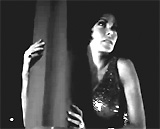 Barbara Thomas (Pat Barrington) in Opening: "How did this happen to me? Why?" 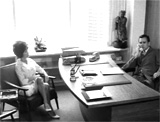 Barbara With Her Busy Businessman Husband Barton (Sam Taylor) 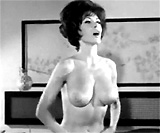 Barbara as Prostitute 'Brandy' Stripping for First Client  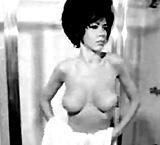 Showering After Sex  Barbara With the Conventioneers  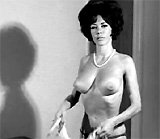  Barbara With "The Eater" 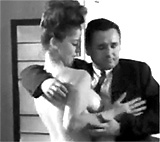 Final Sequence: Barton with Hooker 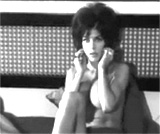 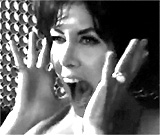 Barbara's Reaction to Barton's Presence at Orgy 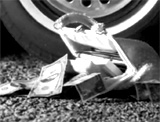 Barbara's Discarded Purse with Money Blowing Away 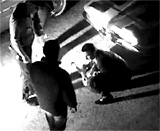 Barton with His Dead Wife Barbara In His Arms |
||||||||||||||||||||||||
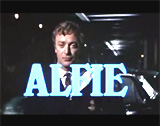
|
Alfie (1966, UK) This was the original Alfie film - Lewis Gilbert's sex-comedy/drama about a hedonistic, misogynistic, Cockney ladies' man title character (Michael Caine in his first major lead role, an Oscar-nominated one). The romantic drama/comedy was reflective of the spirit of the Swingin' 60s in England, along with other similar films including A Hard Day's Night (1964), Darling (1965) and Blowup (1966). It was also unusual that Alfie often candidly and amusingly addressed the audience directly (breaking the so-called 'fourth wall') - beginning with the opening title.
Alfie Elkins (Michael Caine) was portrayed as a smug, working class anti-hero playboy/Casanova who was employed as a chauffeur, and considered himself an uncommitted "free agent." Although the film was a wall-to-wall compilation (with a running commentary) of Alfie's many amorous affairs and one-night stands (with lots of sex-related dialogue), there was no nudity in the film.
He bedhopped, loved (and left) many women (or "birds") throughout the course of the film, including:
It was considered daring and shocking in its time, with an examination of taboo subjects and the consequences of the sexual revolution in the swinging 1960s. Some of Alfie's romantic and physical setbacks included his bout with tuberculosis, his slight mental breakdown following his permanent separation from Gilda, his abrupt breakup with Annie, and the revelation that Ruby had taken another younger lover (or "bloke") - she told him: "He's younger than you are" - devastating to his ego. The most controversial and devastating scene for Alfie was Lily's illegal (post 28 days) abortion, performed by an 'Abortionist' (Denholm Elliott) (the word was never explicitly mentioned in the film) in Alfie's apartment for 25 pounds. Alfie tried to explain the reason for the end of the pregnancy as a "moral lapse," since Lily was married and he was single: "She needs helping because her marriage would look very dodgy if her husband came out at this stage of the game. Got me? And she's got three other kids as well." Alfie expressed his concern (to the camera) for the predicament he found himself in:
After the abortionist left, Alfie was forced to slap Lily across the face when she began to scream in pain. Alfie briefly left and discovered that Gilda had been officially married to her long-time beau - bus conductor Humphrey (Graham Stark) (he had assumed adoptive custody of young Malcolm Alfie) in order to establish a normal family life - and he watched in a church as they baptized their newborn baby daughter together. When he returned to his apartment, he viewed the stillborn child's fetus in his kitchen (off-screen) - the unexpected shock caused tears and sobbing. Shortly later, he described his surprise at the sight to his pal Nat (Murray Melvin) - and felt self-pitying for his wasted opportunities:
In the final scene after all of Alfie's earlier conquests had now moved on (including recent revelations by Ruby and Siddie), Alfie spoke these last words - asking the viewer at the end of his reflections: "What's it all about?" when he began to seriously consider the consequences of his artificial existence and the trail of emotional devastation he had left behind - and he decided to befriend a stray dog next to him:
His monologue was followed by the title song performed by Cher (Cilla Black in the UK release) during the end credits (without a title), beginning with the catchphrase words: "What's it all about, Alfie?" |
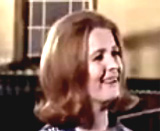 Siddie (Millicent Martin)  Gilda (Julia Foster) 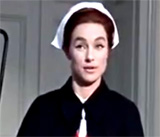 Carla (Shirley Anne Field) 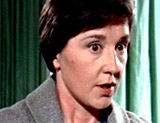 Lily (Vivien Merchant) 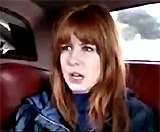 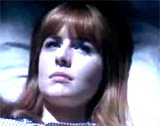 Annie (Jane Asher)  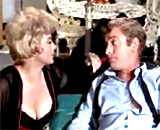 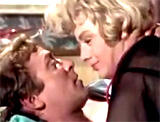 Ruby (Shelley Winters) 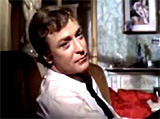 Alfie Addressing the Camera - His Reaction to the Abortion 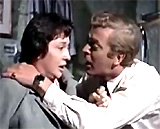 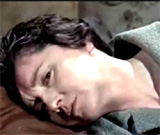 After the Abortion Procedure, Alfie's Slap of the Pained Lily to Silence Her 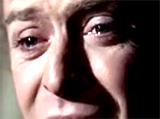 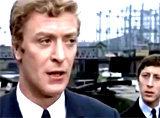 Alfie's Reaction to Aborted Fetus 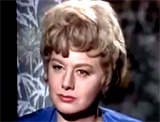 Ruby's Revelation to Alfie About Her New Love: "He's younger than you are" 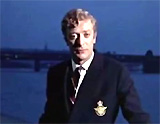 Alfie's Final Monologue to the Camera |
||||||||||||||||||||||||
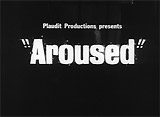
|
Aroused (1966) Director Anton Holden's horror/thriller was a black and white 'roughie' (with superb cinematography by Gideon Zumbach, and a jazzy soundtrack) that told of a misogynistic psycho-serial killer on the loose in Manhattan. The rationale for his violent and murderous impulses: an abusive domineering prostitute mother from his past. The noirish film was well-written and photographed, with taut set-pieces, close-ups, freeze-frames, and a twist ending, although it was tedious and drawn-out in places. The grindhouse feature obviously inspired the later exploitation classic by William Lustig, Maniac (1980). In the film's opening scene, short-haired blonde professional prostitute Pat Wilson (Marlene Stevens) was servicing a client in a bed with satin sheets. She did not know that she was being spied upon from a fire-escape outside the apartment's bedroom window. She was seen both topless in bed and also in front of her mirror. She was killed after being attacked in the shower. Pat was grabbed and wrapped in the shower curtain, thrown onto the bathroom floor, and then asphyxiated. It was a Psycho-like scene, accompanied by a freeze-frame and an audio flashback of the killer's "whore" mother (as a prostitute who was servicing a 'john' with her bothersome young "brat" or "bastard" son in the room, as the man asked: "What's that kid doin' here? ...I didn't pay $10 bucks to have a kid watch me. Get him out of here!"). Then the killer kissed the dead corpse and made necrophiliac love to her, before kneeling over her dead body.
Pat's lesbian lover ("buddy") Ginny Smith (Janine Lenon, or Djanine Lenon), a blonde free-lance model, later opened the door with her own key and almost knifed a man (thought to be the killer) hovering over Pat's body, but she was grabbed just before striking. She learned that the two men in the apartment were cops investigating the case of the "sex killer." Sharp-jawed and reckless handsome rookie detective Johnny (Steve Hollister), married to young wife Ann (Joanna Mills), was one of the officers there with his boss Artie. Johnny was dedicated to the case and intent on bringing in the killer, who was believed to be targeting hookers, call-girls, and streetwalkers. While Johnny questioned Ginny the next day, she confessed that she and Pat were lovers, and that the killer was a maniac who was probably very timid and "scared of sex" unless a female advanced on him. With Ginny's help of procurement, Johnny decided that he would use a streetwalker as 'bait' or as a "decoy" to lure and catch the killer. Meanwhile, Ginny did some sleuthing on her own. From the local bar where she often sought clients through the bar owner Gus (Ted Gelanza) (one of her pimp-procurers), Ginny stealthily followed the creepy bartender Louis (Tony Palladino) - after he was abruptly fired by Gus. She pursued him as he meandered through the NYC streets to his walk-up apartment on W. 71st St. A few minutes later after he left, she entered and became disturbed when she saw that his run-down, city apartment was filled with mannequin body parts, photographs of nude prostitutes, and a stuffed teddy-bear on a hard bed or massage table. That same night, as streetwalker Angela (Fleurette Carter), one of Ginny's bar friends that Johnny had privately hired, prowled the streets for clients (with Johnny providing protection and following close behind), her ploy to entrap the killer didn't seem to work. At the end of the night as she took an elevator up to her high-rise apartment, the ex-bartender entered the elevator from the 3rd floor. She recognized him, but didn't suspect that he had been stalking her. When she invited him to have sex: ("I was looking for some company tonight"), she met her demise during a french-kiss. He impaled her through the stomach with a sharp stiletto knife as she screamed. Then, as he ripped off her clothes and sexually assaulted her dead corpse, the image freeze-framed and he again heard voices from his past when he was an abused young boy witnessing his hooker-mother with male clients. On the ground floor, Johnny suspected that something was wrong when he heard the emergency bell ringing. He rushed up the stairs and climbed down the elevator shaft from the rooftop to enter at the top of the elevator, where he found Angela's topless and bloodied corpse on the floor - but the killer had already disappeared. After failing miserably, Johnny was reprimanded by his boss Artie for being reckless. He met up with his wife Ann on the street, and unwittingly sent her home with Louis (whom he knew from the bar) as her night-time escort. Meanwhile, when he went to speak to Ginny about the recent killing - he cheated on Ann. The bi-sexual prostitute provided him with oral sex. While they laid naked together, he non-chalantly told her that Ann had been taken home by the bartender. She reacted: "I think he's the killer!" - and they rushed to save her. At the same time, Ann was being endangered by the butcher knife-wielding psycho-maniac in her kitchen - she fought him off, but was partially stabbed in the side before he was scared off by Johnny's and Ginny's arrival. In the end, a group of assembled "whores" led by Ginny confronted Louis inside his apartment. With a knife to his throat, Ginny first threatened: "You're just in time, Louis. We're going to have a party...You're the guest of honor." They vengefully stood over him and held him down. As he struggled, they stripped him of his pants and then Ginny castrated him with his own stiletto knife, to transform him into "a boy soprano." As blood spurted from his groin area between his legs, Louis screamed out: "Mama, Mama." Johnny and a contingent of police arrived on the scene and found Ginny holding the bloody knife.
|
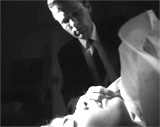 Detective Johnny Over Pat's Dead Corpse 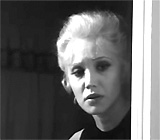 Ginny in Pat's Apartment After Her Murder 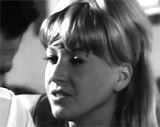 Detective Johnny's Young Wife Ann (Joanna Mills) 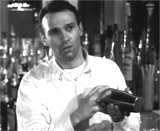 The Bartender Louis (Tony Palladino) 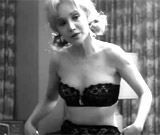 Pat's Lesbian/Bisexual Lover: Ginny Smith (Janine Lenon) 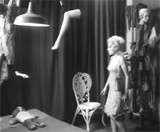 Ginny in Louis' Creepy Apartment 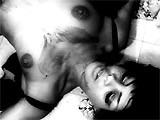 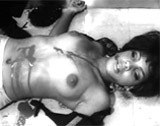 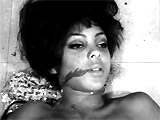 The Second Victim - Streetwalker Angela (Fleurette Carter) 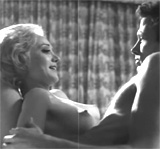 Johnny Cheating on Ann and Having Sex With Ginny  Ann Attacked by Louis in Her Kitchen |
||||||||||||||||||||||||

|
The Bible...In the Beginning (1966, US/It.) John Huston's epic Old Testament film didn't cover the entire Bible - just the first 22 chapters of the Book of Genesis, including the creation story (Adam and Eve) and the expulsion from Eden, Cain and Abel, Noah and the Ark/the Flood, and the story of Abraham (wife Sarah, handmaiden Hagar, and son Isaac). The story of the Nimrod and the Tower of Babel and Sodom and Gomorrah were also featured. It included a highly-anticipated, 20-minute opening sequence detailing the story of Creation of 'mankind' from reddish-brown dirt in the golden-lighted Garden of Eden with two fair-skinned humans:
Both characters were modestly and prudishly nude, one of the first instances in a mainstream US feature film in which there was full-frontal nudity from both sexes) - although they were discreetly and strategically photographed with long shots and out-of-focus buttocks. To avoid outright nudity, knees were often bent to cover the genitals, and Eve's hair always covered her breasts. They were positioned behind bushes or tropical leaves to shield their private parts. After the pair ate the forbidden fruit from the Tree of Knowledge (tricked by the serpent), they were banished - clothed and no longer innocent. |
 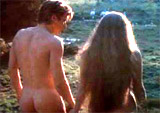  Adam and Eve |
||||||||||||||||||||||||
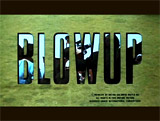
|
Michelangelo Antonioni's first English-language film Blow-Up (1966) was set in mod-Swinging 60s London. When Antonioni refused to cut the few glimpses of female nudity in the film, it was released without the MPAA's seal of approval, and engendered even greater popularity for the arthouse film. It received Academy Award nominations for Best Director and Best Original Screenplay. This breakthrough film was often noted for introverted fashion-glamour photographer Thomas' (David Hemmings) orgasmic, frenzied camera-shoot scene with various 'birds' including skinny, writhing model Veruschka as he straddled her on the floor and pointed his phallic camera at her:
The film also featured Vanessa Redgrave as the Girl, persistently begging (and eventually offering sexual favors when she went topless - more revealing in some full-frame video versions) and bargaining for Thomas' roll of incriminating film that he had shot of her in a public park with an unidentified, middle-aged man. The enlarged photos eventually showed possible evidence of a murder - a shadowy figure and a hand holding a gun in the bushes behind a fence, and possibly a dead body.
The most notorious scene was Thomas' teasing sex with two naive, teenaged groupies or "dolly birds" (blonde Jane Birkin and brunette Gillian Hills) who stopped by his studio on their second visit. While trying on clothes, the skinny blonde was stripped of her clothes by Thomas, and then she wrestled her dark-haired friend and she was stripped too, claiming: "She's got a better figure than me." They ended up in a threesome orgy with him on a extended roll of purple backdrop paper. The scene featured the first fleeting views of pubic hair in a mainstream film for American audiences.
In another love-making scene, he watched as his unhappily-married next-door neighbor Patricia (Sarah Miles) was underneath her husband Bill (John Castle), Thomas' artist friend, who was on top making love to her. She wordlessly entreated Thomas in their flat to position himself and stay in view nearby so she could achieve orgasm - his presence aroused her passion. When he next saw her, he asked: "Do you ever think of leaving him?" and she responded: "No, I don't think so." Before leaving, she also inserted another request: "Will you help me? I don't know what to do," but the subject quickly changed. The final enigmatic scene was of a group of mimes playing a mute game of tennis with an invisible, non-existent tennis ball on a tennis court (the soundtrack picked up the sound of the tennis ball however) - Thomas joined in the game (and threw the imaginary ball back to them). the film ended with an aerial view of Thomas standing at a distance in the middle of a grassy field in the park near the tennis court, with his camera in his hand; he faded from view just before the words THE END zoomed forward. |
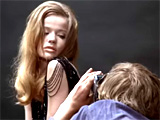  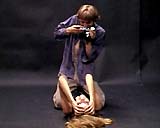 Model Veruschka (Herself) 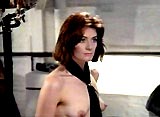 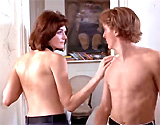 The Girl (Vanessa Redgrave) 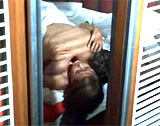 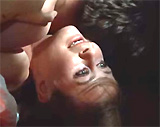 Patricia (Sarah Miles) 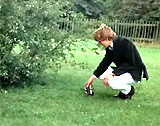 Missing Body the Next Day 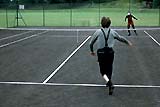 Muted and Pantomimed Game of Tennis  Aerial View Ending |
||||||||||||||||||||||||
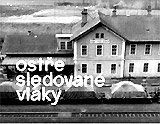
|
Closely Watched Trains (1966, Czech) (aka Ostre Sledované Vlaky) Jirí Menzel's war-related, coming-of-age romantic drama, a Czech New Wave film, was the 1968 winner of the Academy Award for Best Foreign Film of 1966 - with the intriguing tagline:
The main protagonist was Milos Hrma (Vaclav Neckar) - the naive, newly-hired local assistant train dispatcher at Kostomlaty station near Prague during WWII, who was to 'closely watch' the trains so they wouldn't crash. His main issue was a continuing over-sensitivity problem with premature ejaculation. A love-making attempt with seductive, nubile conductress Masa (Jilka Bendova) failed, although she was understanding. He followed up with a near-fatal suicide attempt (by slitting his wrists in a steamy hot hotel bath tub) due to his adolescent anxiety and angst. During his recovery, Milos told Doctor Brabec (Jiri Menzel, the film's director): "So you see, doctor, I am not a real man, and I don't even want to be one. Everything is so difficult in life, for me. While for others it's all child's play. In other words, when I was to act, I flopped." The doctor recommended that he "choose an older, experienced woman to initiate love-making." He followed up with an awkward encounter with stationmaster Max's older wife (Libuse Havelková), whom he told about his raging hormonal problems with premature ejaculation and impotency:
As they talked and he hinted at having sex with her, she was stroking a goose's long neck that simulated the masturbatory, up-and-down phallic motion of male stimulation. By film's end, Milos was sexually fulfilled by beautiful Resistance follower Viktoria Freie (Nada Urbánková), who had delivered a homemade bomb to the station, to be used to destroy a German Nazi ammunition train shipment. Before the plan was carried out the next day, when Milos was alone with her and told her of his sexual issues, she urged him as she undressed and caressed his face:
Sadly, Milos lost his life after he dropped the bomb from a train tower onto the loaded flat car of a freight train as it passed by below. The film's most memorable tryst, however, was between Milos' womanizing mentor/superior - the bespectacled, short, and balding Ladislav Hubicka (Josef Somr), and young station telegraphist Zdenka (Jitka Zelenohorská). During a comic sexual horseplay scene, Hubicka chased her around the station office at midnight (Hubicka: "I told you I'd spank you").
He stamped her bare thighs and bare buttocks (she voluntarily pulled her own panties down) with the State's official bureaucratic ink stamp seal, causing embarrassment to her mother and other officials who learned of the strange offense. |
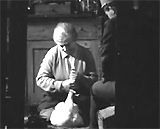 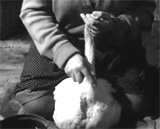 The Phallic Stimulation of a Goose's Neck 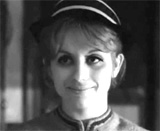 Viktoria Freie (Nada Urbánková) 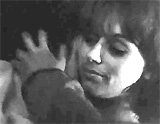 Fulfilling Sex with Viktoria |
||||||||||||||||||||||||
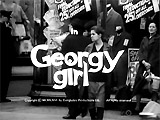
|
Georgy Girl (1966, UK) Originally considered bold and ground-breaking (but now only self-conscious, tame, and dated), this Swinging 60s "free love" comedy film from the UK starred Best Actress-nominated Lynn Redgrave. It was notable as the first film to carry the label "suggested for mature audiences" - or M rating, only a month after the Production Code was revised. Its subject matter of adultery, promiscuity, illegitimate birth and abortion were undoubtedly responsible for the rating. Many reviewers have noted the similarities between this film and the Bridget Jones' franchise of films. The film was boosted by The Seekers' hit theme song "Georgy Girl", with a catchy tune and lyrics:
Its bittersweet, adult-oriented tale told of the morally-ambiguous title character Georgina "Georgy" Parkin (Lynn Redgrave) - a plump, naive, homely, and childish misfit who was mostly unattractive and past youthful prime at age 22. A children's dance teacher, she was the daughter of parents who were in England's servant class. However, Georgy found herself propositioned (with an official contract) to be a mistress when she was advanced upon by rich, paternalistic and older benefactor - a wealthy and unhappily-married Mr. Leamington (James Mason) who was the boss of her parents (Bill Owen and Clare Kelly). Learnington was stuck in a loveless marriage to sickly wife Ellen (Rachel Kempson). At the same time, Georgy was living in an apartment with her pretty yet amoral, trampish and self-interested roommate Meredith Montgomery (Charlotte Rampling), a concert violinist. After two previous abortions, Meredith was bitchy about her current pregnancy although she had decided to marry her randy, Cockney slacker boyfriend - Jos Jones (Alan Bates), a lazy bank clerk, and keep the child:
Jones moved in with the two women - creating a love triangle. One evening after a bitter argument between Meredith and Jones, he suddenly kissed Georgy - initiating a secret love affair between them. After Meredith gave birth - she wanted to put the child up for adoption and divorce Jones. Georgy opted to care for and serve as the unwanted baby's mother with Jos, but soon after, Jones wanted no part in fathering the child. Georgy's affair cooled with him and he moved out, abandoning both of them. Georgy manipulatively brought conveniently-widowed Leamington to the rescue to marry her (so that the baby wouldn't be taken from her by Social Services), help provide financial support, and adopt the child as their own. |
 Georgy (Lynn Redgrave) with Mr. Leamington (James Mason) 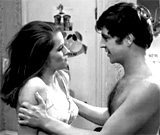 Meredith with Jos Jones (Alan Bates)   Georgy with Jos Jones |
||||||||||||||||||||||||

|
Hawaii (1966) Only part of James Michener's best-selling, epic 1959 novel Hawaii (both fictional and non-fictional) was the basis for the lengthy film adaptation, directed by George Roy Hill. Former blacklisted screenwriter Dalton Trumbo penned the script with Daniel Taradash. The movie basically concentrated on the settlement at Lahaina (Maui) in the early 1800s. It began with a rousing and inspiring sermon by a native Hawaiian islander named Keoki Kanakoa (Manu Tupou) (in history: Henry Obookiah) at Yale University in New England. One of the missionaries who was compelled to journey to Hawaii around 1820 was Rev. Abner Hale (Max Von Sydow) with his new wife Jerusha Bromley (Julie Andrews) (in history: Reverend Hiram Bingham). Their efforts were to bring Christianity to the "heathen" natives - Malama, the Queen, the Alii Nui, (Jocelyne LaGarde) (in history: Queen Ka'ahumanu), and to end pagan idolatry worship of totem rocks (phallic symbols) at shrines (heiau). One of the things immediately encountered when the stiffly-dressed New Englanders sailed into Lahaina port was that many of the islanders removed their sarongs or loin cloths, and swam out to the ship or rowed in outrigger canoes - waving sexily and happily greeting the repressed newcomers. In the film, there was very discreetly-filmed (or darkened) topless female nudity, mostly from the wahine housemaid provided by Malama for the Hales - Iliki (Lokelani S. Chicarell). However, in terms of historical authenticity, in traditional Hawaiian culture at the time, female breasts were not covered, and there were no bathing suits for swimming. The nude 'entertainment' provided by topless young girls during an evening's dancing and drinking with whalers who docked in Lahaina was particularly frowned upon by the well-intentioned, but viciously-intolerant Rev. Hale who sternly objected: "How can you do this to this innocent child? Have you no mothers at home, no sisters? May God in his mercy forgive you" - he vehemently chastised the men as he dragged Iliki away. He called her a "wicked creature" although she innocently objected: "I didn't do nothing bad." Hale was adamant about forbidding nudity, and open sexuality. Later, the whalers, led by Captain Rafer Hoxworth (Richard Harris), Jerusha's ex-suitor, burned Abner's church in protest after they were prevented from sleeping with the young island women. |
   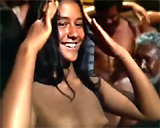 Iliki (Lokelani S. Chicarell) 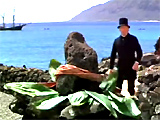 Rev. Abner Hale (Max Von Sydow) Attempting to Destroy Phallic Totem Stone at Heiau |
||||||||||||||||||||||||
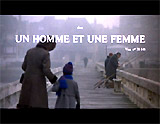
|
A Man and a Woman (1966, Fr.) (aka Un Homme et Une Femme) French New Wave director Claude Lelouch's simple and pleasant romance was the Palme d'Or winner at Cannes and Oscar-winner of Best Foreign Language Film. It was a beautifully-filmed, impressionistic story of the slow-building affair between two single parents who had both lost their spouses. They happened to meet when visiting their children at a Deauville boarding school:
Eventually by film's end, they consummated their love in a non-explicit, bitter-sweet scene that alternated between B/W and color images (including flashbacked, haunting guilt-ridden, melancholic memories of Anna's husband of her past). She could not fully give herself and thought that would be the end of their relationship when they silently parted. But then, in the open-ended conclusion, they joyously met again at the train station in Paris when she arrived there. |
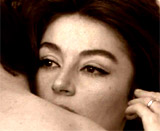 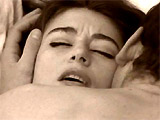 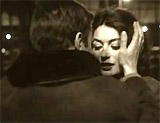 Anne Gauthier (Anouk Aimee) |
||||||||||||||||||||||||

|
Mondo Topless (1966) (aka Mondo Girls, Mondo Top) Russ Meyer's pseudo-documentary (or mockumentary) was notable as the "nudie" sleaze king's first color film, advertised with the tagline:
Throughout, an off-screen narrator (John Furlong) would hilariously comment upon the titillating action of the "unrestrained female anatomy" and "the world's loveliest buxotics." The thrown-together film included screen-test footage of Lorna Maitland, the title character of Meyer's previous film Lorna (1964). The sexploitation film began as a travelogue in San Francisco (where the phenomenon of gyrating toplessness first appeared, supposedly, before sweeping across the country), led by naked 44" stacked Babette Bardot driving around stark naked. Even Coit Tower was photographed to look like a phallic symbol.
Ultra-buxotic females spoke about their lives as topless go-go girls/strippers, along with many topless dances amd swinging breasts, performed in various locales, and usually gyrating to the wild beat of a nearby radio or tape player:
The sights were also viewed in various strip-joints in Europe (footage from Meyer's long-unseen documentary Europe in the Raw (1963)), in Belgium, Hamburg, Copenhagen, and Paris, where strippers performed on indoor stages. Some of the dancers spoke about their views of men, about disrobing, bra sizes and about the difficulty of buying clothes for the big-busted woman, etc. |
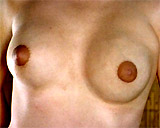    Lorna Maitland (Herself) ("That Girl From Lorna") Europe in the Raw footage (below)  Denice Duval (Herself) - Paris  Gigi
La Touche (Herself) - Paris Gigi
La Touche (Herself) - Paris 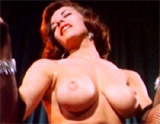 Veronique Gabriel (Herself)
Veronique Gabriel (Herself) Abundavita (Herself) - Berlin
Abundavita (Herself) - Berlin |
||||||||||||||||||||||||

|
Co-author and director Mai Zetterling's second feature film was this controversial, ponderous, B/W, 90-minute Swedish drama about a young boy's development of sexual neurosis, with obvious Oedipal themes, that debilitated him as an emotionally-sterile man-child adult. In some ways, it paralleled various surreal Fellini movies (i.e., La Dolce Vita (1960, It.)), and the same year's Persona (1966, Swe.) by director Ingmar Bergman, and was thematically similar to Bergman's Wild Strawberries (1957, Swe.) and to parts of Roger Corman's The Masque of the Red Death (1964). The emotionally-cold and humorless arthouse film immediately caused waves of protest. Its premiere at the Venice Int'l Film Festival was forced to be viewed in private by the jury. It was also well-publicized that former child star Shirley Temple Black, who was part of the San Francisco Int'l Film Festival, protested its showing as pornography by resigning. The daring, decadent and shocking, somewhat exploitative film was mostly told in flashback, seamlessly switching or alternating often from the present to the past and then back again. The film opened on the eve of his marriage, in the middle of winter, when bearded Jan (Keve Hjelm as adult) and his long-haired, blonde fiancee Mariana (Lena Brundin) returned to his childhood country home. It was a gloomy, cavernous, unoccupied, but furnished and ominous medieval castle (with one female servant, Melissa (Lissi Alandh)), where he had spent his troubled, growing-up years, 20 years earlier, as a young boy (Jörgen Lindström at age 12). His journey was one of self-discovery - to determine the cause of his corrupted and maladjusted life, his cruel streak and game-playing, his problems with growing up, his unusual sexual fantasies, and his lack of sexual drive with his fiancee. He had been raised in a perverse way by his strangely insane, dotty white-haired great-aunt Astrid (Naima Wifstrand) (with whom he spent much of his spare time) and his hedonistic, neglectful, and upper-class aristocratic parents: his sadistic, sexually-abusive and self-centered mother Irene (Ingrid Thulin) and father Bruno (Lauritz Falk). Jan recalled various strange experiences and perversions that he had been subjected to, seen in the many flashbacks including:
In the film's catharctic conclusion, guests were invited for a climactic party after the couple determined that they would hire a company to dynamite the castle in order to purge, banish and obliterate Jan's disturbing memories that stemmed from his home, and to find ultimate "freedom" for him. The anarchic destruction would help begin the process of healing Jan from his sexual hang-ups, and have him forget the past. Jan announced to everyone:
Valuables were stuffed into bags or other cases (candelabra, a fur coat, religious iconography and jewelry, a tapestry, furniture, statues, vases and more) as guests looted the castle while they hurriedly evacuated and loaded up their vehicles outside. The playing of the national anthem and Jan's flare-gun signaled the start of the demolition. Together, Jan and Mariana playfully danced and embraced outside in the snow. |
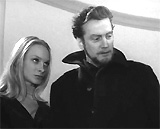 Jan (Keve Hjelm) Leading His Fiancee Mariana (Lena Brundin) During a Guided Tour Through His Childhood Home - a Castle 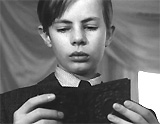 Jan as a 12 Year Old Boy (Jorgen Lindstrom) 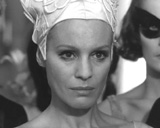 Jan's Mother Irene (Ingrid Thulin) 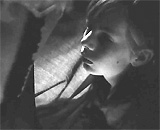 Jan Under His Mother's Skirt 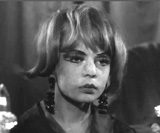 Jan Trying On His Mother's Makeup and Fake Eyelashes, Plus a Wig 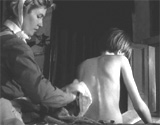 Nurse's Bath 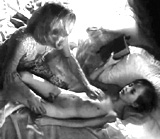 Tickling Naked Jan on the Bed 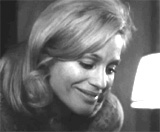 "What a nice little thing you have?" 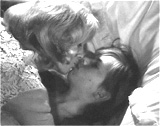 Kissing Him Repeatedly 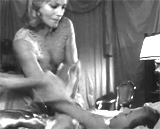 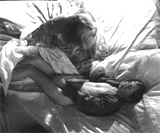 Catching Him Masturbating Under the Quilt - Angry at First, But Then Ordering Him to Continue, To Humiliate Him Further 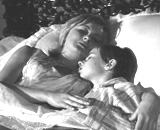 Jan in Bed with a Young Relative After His Mother's Death 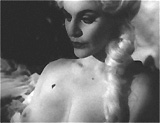 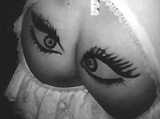 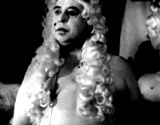 Bawdy Home Movies of Jan's Mother and Father Having Sex Shown During Jan's Honeymoon Party |
||||||||||||||||||||||||

|
One Million Years B.C. (1966, UK) This British-made adventure sci-fi film (shot in the Canary Islands) by director Don Chaffey and Hammer Films was a remake of the earlier Hollywood film, One Million B.C. (1940), starring Victor Mature and Carole Landis, two love interests during caveman times (an anachronism since dinosaur creatures and humans never co-existed). The film's realistic prehistoric creatures (created with stop-motion animation and enlarged live specimens) were the work of Ray Harryhausen: a giant lizard and spider, brontosaurus, an Archelon (giant turtle), an Allosaurus, a battle between a Ceratosaurus and Triceratops, and a flying Pteranodon.
At one point, Loana (who had only a few sparse lines of dialogue) had to fight off the advances of competing love-interest, Tumak's ex-lover Nupondi (Martine Beswick). The reigning sex queen's 'primeval woman' poster was a major best-seller at the time, and adorned many college room walls. |
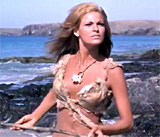 Loana (Raquel Welch) 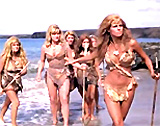 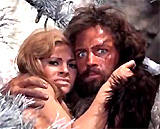 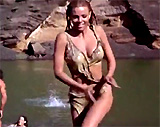
|
||||||||||||||||||||||||

|
Persona (1966, Swe.) Ingmar Bergman's psychological, dramatic thriller, a film-within-a-film, was about illness, insanity, personal identity and death. The abstract film told about two women who both experienced life-changing events involving motherhood, abortion and childbirth. The two women who became associated with each other were a nurse and her patient:
Treatment would be conducted in a doctor's seaside cottage or summer vacation home. Elisabet's condition was diagnosed by a Doctor (Margaretha Krook) who declared that the patient had deliberately decided to remain silent and immobile: ("The result is clear: She's perfectly healthy, both mentally and physically. And it's not a question of some hysterical reaction either"). During treatment, Alma self-therapeutically described to Elisabet about how no one ever listened to her before. She expressed her growing affection and idolizing attachment to her famous patient:
During a vivid confessional monologue (one of the most explicit verbal descriptions of sex ever heard on screen), Alma (who was engaged to fiancee Karl-Henrik at the time) described a private and secret sexual experience to Elisabet that she had had at the beach with a friend named Katarina when they were sunbathing in the nude, completely naked. Two boys came up to them and Katrina encouraged one of the boys to have sex with her:
Feeling left out, Alma also asked for sex too:
A second boy named Peter was also invited to participate in the orgy:
That evening, although she felt guilty, Alma had sex with Karl-Henrik after dinner ("Then we had sex. It's never been as good, before or since. Can you understand that?"). However, she became pregnant, was forced to abort the baby, and afterwards suffered a "guilty conscience."
As the film proceeded forward, there was the growing realization that the two women (often seen in doubled or overlapping profiles) were interchangeable and very much alike, but it was an increasingly harmful relationship and a destructive merged identification between the two, when Alma specifically stated: "Is it possible to be one and the same person at the very same time? I mean, two people?"; when Alma began crying, Elisabet comforted her; Alma continued: "...We're alike somehow. I think I could turn into you if I really tried. I mean inside. You could be me just like that, though your soul would be far too big. It would stick out everywhere!" Then, Alma made the shocking discovery, when reading one of Elisabet's unsealed letters for delivery to her doctor, that Elisabet was feigning illness, and actually 'studying' her: (excerpt from the condescending letter: "It's a lot of fun studying her. Sometimes she cries over past sins - an orgy with a strange boy and a subsequent abortion. She complains that her notions about life fail to accord with her actions"). In the film's conclusion - Alma spoke to Elisabet about the picture of her son that she had torn up at the hospital: ("What are you hiding under your hand?...It's the picture of your little boy. The one you tore up. We have to talk about this"). During the scene, the camera was on Elisabet's face as she listened to Alma (off-screen) narrating Elisabet's life story back to her. Elisabet had become pregnant, but fearing loss of her acting career, failed in two self-induced abortion attempts to rid herself of an unwanted and unloved son. The same scene was repeated, but with the camera on Alma's face. At the conclusion of the repeated scene, Alma feared that they had become too identified with one another, and asserted her identity as Alma. She realized that, unlike Elisabet, she had truly wanted a baby to love, and that she would never be like Elisabet:
Next was a striking image of their two faces juxtaposed (or spliced together) to appear as one face (half of Alma's face, on the left, and Elisabet's half visage on the right). In a hospital room, Alma persuaded Elisabet to say the word "nothing" - the film's final lines of dialogue (Alma: "Try and listen to me now. Repeat after me. Nothing... Nothing. No, nothing... " Elisabet: "Nothing."). In the concluding scene, the two packed up and only Alma was seen departing by bus from the cottage (there was a striking mirror-image dissolve of Elisabet touching Alma's head). As the film ended, the crew and director were seen filming their exit. There was a brief reprise of the prologue image of a boy (presumably Elisabet's son) touching large blurry images of the two women, before the film broke away from its projector sprockets and self-destructed - again. |
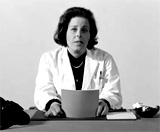 Doctor (Margaretha Krook) 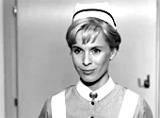 Sister Alma (Bibi Andersson) 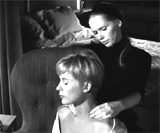 (l to r): Alma and Mrs. Elisabet Vogler (Liv Ullmann) Close-Ups of the Two During Beach Monologue:  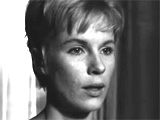 Alma (Bibi Andersson) 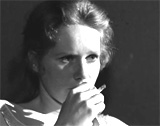 Elisabet Vogler (Liv Ullman) 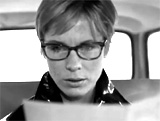 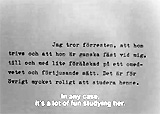
Alma's Shocking Discovery That Elisabet was Faking: ("It's a lot of fun studying her") 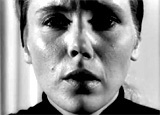 The Famous Shot of Juxtaposed Faces 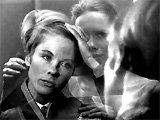 Mirror-image Dissolve of Elisabet Touching Alma's Head 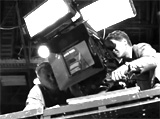 The Director and Film Equipment |
||||||||||||||||||||||||
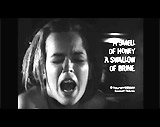
|
A Smell of Honey, a Swallow of Brine (1966) Director B. Ron Elliott's dramatic, bad-tempered, gritty, decadent, trashy and sleazy exploitation "roughie" film (with a script by veteran road-showman and producer David Friedman) offered lots of topless nudity without any actual scenes of sex (only foreplay). It was taglined:
The main character in the low-budget black and white production was a temptress-female named Sharon Winters (Texas-born Stacey Walker, aka Barbara Jean Moore) who would purposely seduce men and then loudly protest rape. In the opening sequence in the front seat of a car, voluptuous blonde tease-bitch Sharon seduced two-month boyfriend Roy Bradley (Michael O'Kelly). On the verge of intercourse with him, she screamed rape to attract a police officer - and after a quick jury trial, Roy was imprisoned for two years for rape and assault. In a conversation with her lesbian roommate Paula Mann (Sharon Carr) about six weeks later, Sharon was brazen about continuing to date other men:
As Paula was departing (and Sharon had finished a bath), they had another short and snippy exchange about their respective sexual orientations:
When Sharon's shy and nervous date, mama's boy and co-worker Dick Owens (Tom Hughes) arrived at the house, she flirted with him and offered him a drink. Upstairs while dressing to go out, she had an enticing idea - she invited Dick, with a beckoning finger, to climb up the spiral staircase to her bathroom. In front of a mirror with her robe exposing her breasts, she provocatively combed her hair - letting Dick have naked views of her when she removed her panties and entered the shower stall's bathtub for a second bath. Afterwards, she stood stark naked in her bedroom to non-chalantly dress in front of him. Then, she approached him to stroke and kiss his face. He followed her into the bedroom and climbed on top of her, while she encouraged him to caress and kiss her. He removed her bra, and then began to unclip her garter and remove her panties - and that's when she began to protest:
Dick hastefully fled the room, and she chuckled when she heard the door slam. Shamed forever, Dick did not report for work the next day, and was soon replaced by Assistant Controller Lowell Carter (Neville Coward/Sam Melville), Sharon's next male target. In her second conversation with Paula in their bedroom, seductress Sharon apologized for her rude bitchy behavior toward her:
Paula offered to give Sharon a nude back massage to make her feel better. Paula went topless when she became overheated and then laid down next to Sharon while continuing to stroke her. Then, her lesbian overtures were suddenly and cruelly rejected by Sharon: "Cut, Paula, that's as far as we go....Get away from me, you, you pervert. Get out! Get out! Get out of this apartment before I call the police. You belong in an institution, you and all the rest of your kind...I only want never to see you again." Later, Sharon directly insulted her lesbian roommate: "Paula, I may be a bitch, but I'll never be a butch."
Lowell Carter began dating and spending a lot of time with Sharon, but didn't pressure her for sex, although they often kissed and petted with her clothes off - without going all the way. He accepted the fact that they would have to wait. Hot and bothered, though, Carter's dreams were affected by his pent-up sexual energy - he erotically fantasized that she was tied half-naked at a stake, while he wielded a whip against her (drawing blood from her thighs). He also dreamed that he had become her sexual slave, and that she toplessly threatened him with a sharp knife.
When she finally decided to have sex with Lowell Carter, she strip-teased in front of him ("You like?"). They showered naked and then got in bed together after she led him on, but then she accused him of rape like all the others. He called her a "tease" - "I wouldn't touch you, you're worse than a disease." He left her for good as he threatened: "Get the hell out of here, tease! I'm gonna get a real woman tonight." She called after him: "Are you gonna rape her too?" He ran away from her and hurried down a dark street - haunted by many erotic images of her sexy body. Carter lustfully attacked another unidentified female as she entered her apartment. There, her screams came to the attention of her male partner (Larry Jones) in the next room, who reached for a gun and shot Carter to death. The film ended with Sharon soon finding another victim, slick-haired band singer Tony (Bob Todd). While they were making out on a sofa, when she began to tease him and then abruptly claimed that they shouldn't go any further: ("Not now...I'm a virgin!"), she also threatened rape and screamed. The chauvinistic male objected ("Are you putting me on, doll? I don't like it when chicks put me on"). When she further protested, he violently assaulted her - he slapped her, grabbed her head, beat it against a table, and then punched her face until she was bloodied:
He forcefully kissed her - the camera pulled back and the screen turned black, as Tony presumably began to rape Sharon. In the final image, Sharon stood on a street-corner as a hooker, with a cigarette hanging from her mouth. |
|
||||||||||||||||||||||||

|
Mike Nichols' acclaimed debut film Who's Afraid of Virginia Woolf? (1966) was an adaptation of Edward Albee's Broadway play, with a screenplay by writer/producer Ernest Lehman. It acquired an astounding 13 Oscar nominations and 5 wins - including its entire Oscar-nominated cast of four (also including George Segal and Sandy Dennis). In addition, it was a direct challenge to the anti-profanity clauses of the Hays Code. The drama contained lots of things that the Production Code felt were violations:
The MPAA ratings board gave the film a seal of approval after Warner Bros. appealed and made a few cuts of the most extreme profanity (such as "screw you"). It was the first film to be released with a "Suggested for Mature Audiences" warning, at a time when the new president of the MPAA, Jack Valenti, was implementing a new ratings system - to help handle sensitive and "mature" subjects. It displayed brutal sexual tensions between its four characters in an all-night drinking fest, especially its sado-masochistic, loving-hating, vulgarities-spewing couple and their two dinner guests:
|
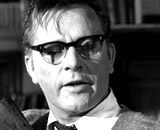 George (Richard Burton) 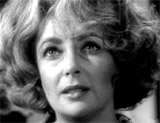 Martha (Elizabeth Taylor) 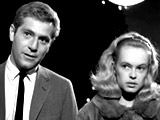 Nick (George Segal) and Honey (Sandy Dennis) 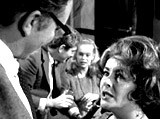 The Ensemble |
||||||||||||||||||||||||